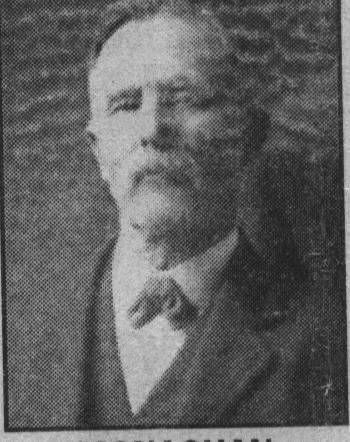|
The following article by Shirley McLellan appeared in The Daily Tribune, January 2, 1998. It is reprinted here with permission from The Daily Tribune. Shirley McLellan and a niece of Mr. Monaghan. Provided by Carol Ring, © The Daily Tribune Soldier's Civil War Diaries Paint Dreary PictureBy Shirley McLellan; Special to The Daily Tribune Berkley - When the regimental band played "Garryowen," John W. Monaghan was there. Monaghan was only 5-foot-4 but he rode with Gen. George Custer's 7th Cavalry through our most of the Civil War and finished his military hitch guarding the wagon train route to Fort Collins, Colo,. and beyond. This son of Erin, whose name is pronounced "Mon-A-Gun" - as he would have told you very quickly if you called him "Mon-A-Han" - is the great-great uncle of Berkley resident Carol Ring. Ring, librarian at Avery Elementary School in the Berkley school district and a professional genealogist, has two of the diaries Monaghan kept in 1864 and 1865. While the entries he wrote in pencil have smudged and faded, most of the entries in ink are very clear. Ring has transcribed the 1864 diary. Monaghan was born near Newmarket, Suffolk, England, on Aug. 14, 1833, and was brought to America by his parents when he was 3. John Monaghan Sr. had a friend already settled in the Irish Hills on a farm two miles from Onstead. The family moved to another farm nearby, owned by a clergyman. When Monaghan was 18, he shipped out on a whaler - his niece said that he was shanghaied - and nobody heard from him for three years. He returned to the United States and married Electa Allen Holliway in February 1861 and shortly thereafter, he enlisted in the 7th Michigan Cavalry. His diary could have been written in any war since military service began. There are many many entries that say, "it rained again and the mud is so deep," or it's bitter cold" or "never saw it so dusty." He "saddled up and moved our camp," "went on picket duty," "crossed the river and came back again" and "laid sick in my tent." Periodically he drew rations and got paid. The 7th Cavalry ranged up and down the Shenandoah valley having endless encounters with "Johnny Reb." Monaghan decried the scorched earth policy the 7th was ordered to pursue. They marched to Berryville and burned all the grass and hay taking all the cattle and horses they could find. Later they took 1,000 hogs. At Port Republic, Custer left their brigade to a command in Division. "Reckon the Brigade will go downhill now for want of a commander," wrote Monaghan. Rations had run out so they were living off the countryside. Oct. 7, 1864, he wrote, "Halted at Woodstock and burnt and destroyed everything same as yesterday. It is the cruelest and most inhuman war that ever was, I believe." Sunday, April 9, 1865, all fighting stopped. The 7th had captured a number of wagons and cannons just the day before. Monaghan wrote the time down, 5p.m. on the 9th. He wrote, "Old Lee surrendered himself and all his staff are prisoners of war." By June, all the prisoners of war had gone home and a number of the cavalrymen had deserted when they got their pay. Monaghan's hitch was not up so by June 14 he was on the road to Fort Levenworth and Fort Riley. Just before they reached the Platte River the heat was overpowering. At Denver City he saw the mountains and 50 Indians. Aug. 2 there was an attack on a wagon train and Laramie station was under fire. Things quieted down again. The stage coaches from the East arrived three times a week and went back again. Coaches going west went once a week with eight troopers to guard them. Monaghan enjoyed going out of the fort at Fort Collins with the hunter to bring in antelope for rations and once shot a large elk. In November 1865 Monaghan and the other time-expired troopers set out back across the plains. They expected to be mustered out at various forts and stations but were not. They were at Fort Levenworth in December in piles of snow with more coming. Monaghan took to going to church and prayer meetings daily. Finally, the Mississippi was crossed and on Dec. 15, 1865, he was at last mustered out and headed for Chicago. He "got on the cars" and by Dec. 20 he was in Jackson. There he signed the payroll for the last time at the local military post and received his discharge. "Got home at 2p.m." he notes on Dec. 25, and the diary ends. He never left home again. His 200-acre farm at Sand Lake is now part of Hayes State Park. Henry Ford wanted to buy his house for Greenfield Village but it was struck by lightning and burned. John Monaghan raised a son, a daughter and a stepdaughter and was a leader in his community until his death on May 16, 1917, in Cambridge Township in the Irish Hills Lenawee County. The Daily Tribune is published by Independent Newspapers Inc., 100 Macomb Daily Drive, Mt. Clemens, MI 48043; The Daily Tribune office is in Royal Oak, MI |